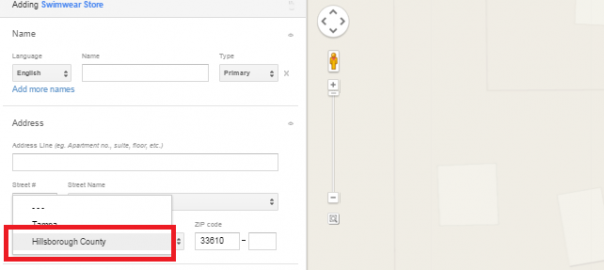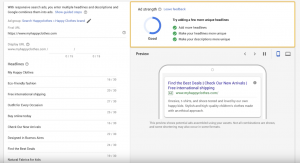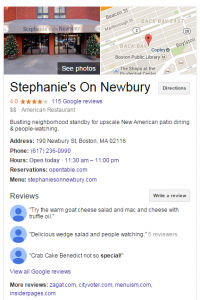You’ve done everything right in terms of local SEO — you’re even ranking high in organic results — but you just can’t seem to get a place in the map pack. What’s wrong? Columnist Joy Hawkins explores.

I always enjoy solving Local SEO puzzles, but there’s one that has baffled me for the last couple of years. I’ve had many other professionals in the Local SEO community look at it, and they were equally stumped. It was one of those cases that seemed to make no sense at all, until it finally hit me a week ago.
The issue was with a handyman company I work with in Florida that has multiple offices. All their offices rank wonderfully for the keyword pattern “handyman + [city]” — except one. Their office in Tampa has always had an issue that I hear about quite often in the Local SEO world: They rank very high organically, but not in the local results (the 3-pack/map pack).
Whenever I come across a situation where organic ranking is high but local ranking is low, it always makes me cringe. It seems to be one of the biggest mysteries out there in Local SEO. I’ve learned a lot in my quest to solve this one and wanted to share it.
If you look at the search engine results pages (SERPs), you’ll see that The Handyman Company ranks first organically for “handyman tampa.” This is the case with most of their locations.
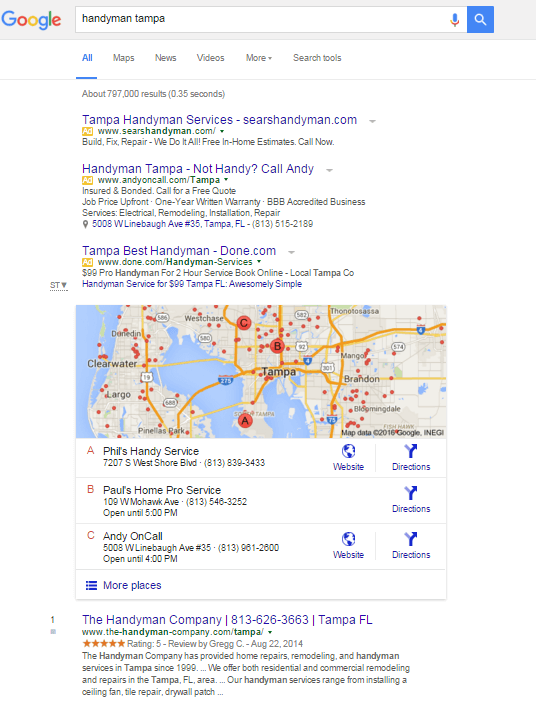
Compare this to Orlando’s office. As you can see from the screenshot below, they rank first locally and organically.

Most (if not all) of the other business locations rank in the 3-pack, as well as the top three organic positions.
And then there’s Tampa. Their local position for “handyman tampa” has not changed in more than two years. It fluctuates one or two positions, but it seems stuck around the ninth or tenth position in local results.
Most people in Local SEO instantly think, “Oh, that location must have NAP issues.” In other words, the assumption is that the name, address and phone number (NAP) aren’t consistent across the web.
This is not the case. We’ve been down that road many times. His citation record is almost perfect. (There is no such thing as “perfect” in citation world, in my opinion.)
It gets more confusing. When I use the Google Ad Preview Tool, set my location to Tampa and search “handyman,” I get The Handyman Company locally as B.
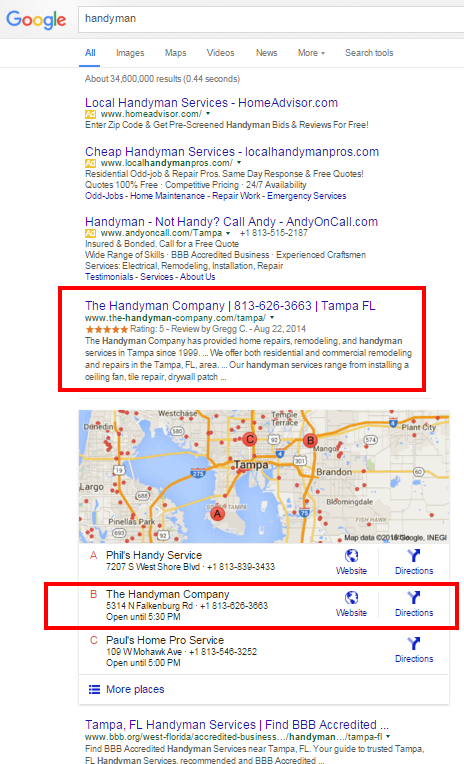
Then it hit me why they rank for one but not the other.
They are not in Tampa.
I hear all the time from Local SEOs that the way to figure out what address to use is through USPS. This is wrong. Google does not care what your mailing address is; they care what your physical address is, and there are tons of cases where those two are different. The Handyman Company definitely has a mailing address in Tampa, but their physical address is not within the city limits.
How Do You Tell What City A Business Is In?
The first way is to go to Google Maps and search the city name (and state). Google will highlight the area on the map that belongs to that city. If your business doesn’t fall inside that highlighted area, it means you aren’t in the city limits. If you aren’t in the city limits, you don’t have a physical address in the city, and this is the #1 ranking factor for the Local 3-pack.

The second way to see what city you’d want to use is to go to Google Map Maker.
- Search the city name, and zoom into the map until you see the location of your business.
- Click the red “ADD NEW” button and select “Add a Place.”
- Put the marker down on the map exactly where your business is.
- Select any random business category and a fake name, and hit “Continue.”
- On the record that comes up, the city that is automatically populated in the city box is most likely the one that Google Maps would consider your address to be in. If it lists a county (as in this case), it’s most likely because the area you are in is unincorporated.
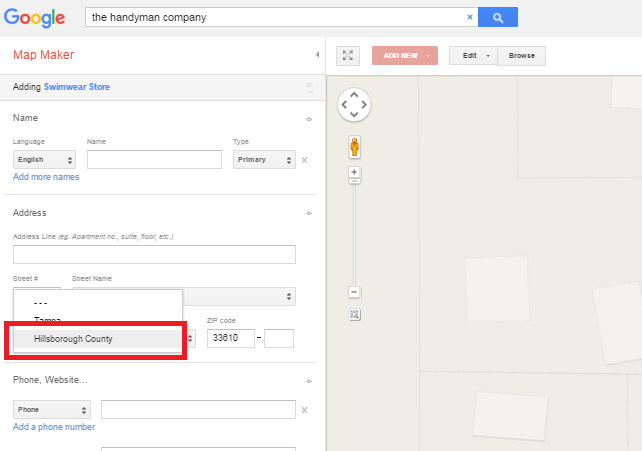
Conclusion: Why Does That Impact One Keyword And Not The Other?
- Keywords without a city name (e.g., “handyman” searched from a user in Tampa, FL) rely more heavily on traditional organic ranking factors.
- Keywords that include a city name (“handyman tampa”) rely more heavily on true local ranking factors, including:
- The physical location of your business (if it is in the physical city limits of the city searched).
- The categories you are using in Google My Business or Map Maker.
- The presence of a duplicate listing (a huge negative factor if one exists).
- Inconsistency with your name, address or phone number (NAP) in the major online directories and data providers.
- The physical location of your business (if it is in the physical city limits of the city searched).
If you find your business in the same situation as this one, my advice would be to focus on gaining organic ranking for the keywords that include city names and gaining local ranking for the keywords that do not. Overall, if you are paying attention to all ranking factors and not just focusing on one thing, your business should see some fantastic results.
[Article on Search Engine Land.]
Some opinions expressed in this article may be those of a guest author and not necessarily Marketing Land. Staff authors are listed here.
(Some images used under license from Shutterstock.com.)
Marketing Land – Internet Marketing News, Strategies & Tips
(70)
